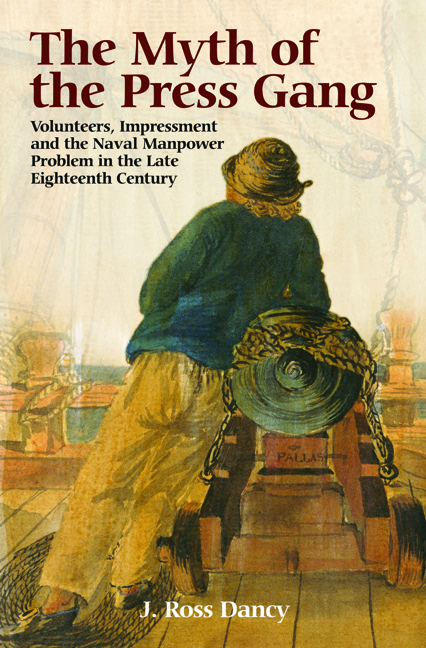 The Myth of the Press Gang
The Myth of the Press Gang Conclusion
Published online by Cambridge University Press: 05 May 2015
Summary
Between 1660 and 1815, the British Royal Navy grew from a seasonal force of around 20,000 men to employing over 145,000 men and being mobilised year-round during war. During the half-century leading up to the French Revolutionary Wars, the number of seamen employed during peacetime nearly doubled, from just under 54,000 in 1738 to over 98,000 in 1791. However, although the Navy required a full seven times more men in 1810 than it had in 1665, the impact on naval administration and the seafaring population of Britain was far greater, as keeping the fleet commissioned throughout the year transformed the manpower problem, as well as many aspects of naval administration. The recruitment of large numbers of men required a streamlined administrative system that raised men more efficiently, yet did not tie down more naval resources than absolutely necessary. This was critically important during the early phases of war, when many ships had to be commissioned quickly.
The introduction of the Impress Service during the Seven Years' War was the most significant step toward a centralised manning process. This system began a change where officers serving aboard warships became less involved in manning their ships, and relied more on naval administration to fulfil this crucial role. The fact that naval manning became more centralised with each successive war during the eighteenth century suggests that this process, at least in the eyes of naval administrators, was more efficient and effective than relying on ships' officers to man their own vessels. However, without statistics we have no solid evidence of how successful naval manning procedures were, nor do we know very much about the men of the lower deck, in particular, how they were recruited.
The examination of ships' muster books, as this book has demonstrated, is crucial to the study of the lower deck of the British Navy during the eighteenth century, and prior to this, there has been no serious study of naval manning that focuses on this period.
- Type
- Chapter
- Information
- The Myth of the Press GangVolunteers, Impressment and the Naval Manpower Problem in the Late Eighteenth Century, pp. 186 - 192Publisher: Boydell & BrewerPrint publication year: 2015
